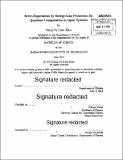Error-suppression by energy-gap protection for quantum computation in open systems
Author(s)
Zhou, Xiang-Yu (Xiang-Yu Leo)
DownloadFull printable version (4.567Mb)
Other Contributors
Massachusetts Institute of Technology. Department of Physics.
Advisor
Edward Farhi.
Terms of use
Metadata
Show full item recordAbstract
Adiabatic Quantum Computation, while attractive due to its "hands-off" approach and intrinsic tolerance of noise, has not been shown to be fully fault-tolerant in a satisfying manner. The protection of the evolution from noise and decoherence through the use of an energy penalty, recently proposed as a method to suppress error in adiabatic algorithms, is also appealing due to its passiveness. In this thesis, we first introduce the background on quantum computation, and discuss existing efforts towards fault-tolerant computation, specifically in the adiabatic model. Subsequently, we will prove a general result concerning the utility of energy-gap protection in generic (not necessarily adiabatic) quantum evolution in open system, and provides analytic bounds on the necessary energy penalty magnitude to achieve good protection. Evidence from numerical simulation is also given to demonstrate the practical usefulness of energy-gap protection for fault-tolerant quantum computation in open systems.
Description
Thesis: S.B., Massachusetts Institute of Technology, Department of Physics, 2014. Missing pages 43 and 44. Cataloged from PDF version of thesis. Includes bibliographical references (pages 57-58).
Date issued
2014Department
Massachusetts Institute of Technology. Department of PhysicsPublisher
Massachusetts Institute of Technology
Keywords
Physics.